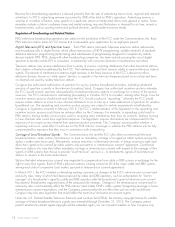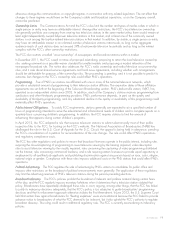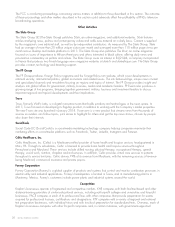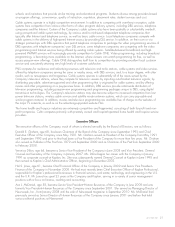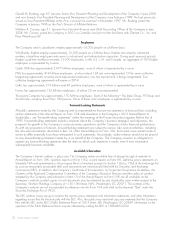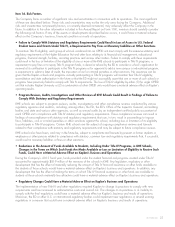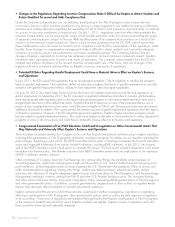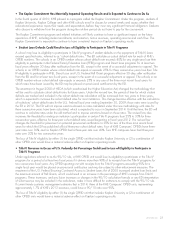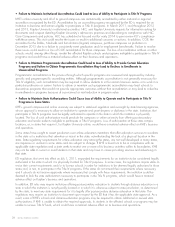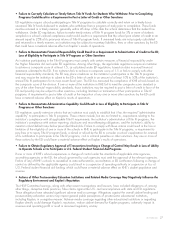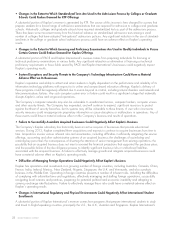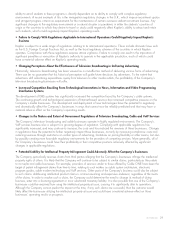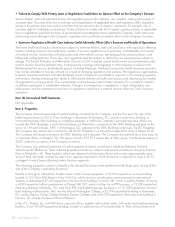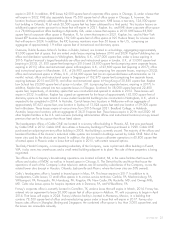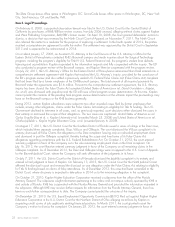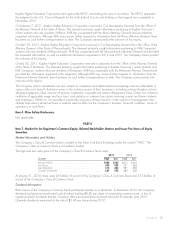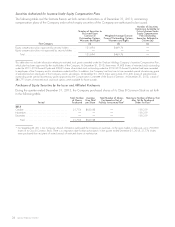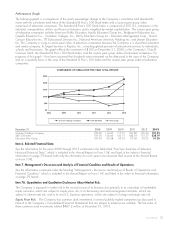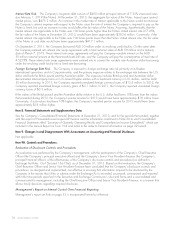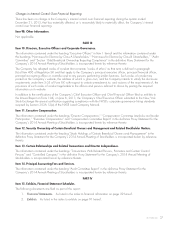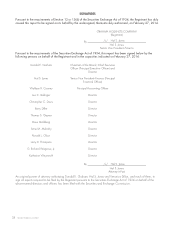Washington Post 2013 Annual Report Download - page 46
Download and view the complete annual report
Please find page 46 of the 2013 Washington Post annual report below. You can navigate through the pages in the report by either clicking on the pages listed below, or by using the keyword search tool below to find specific information within the annual report.• Changes in the Extent to Which Standardized Tests Are Used in the Admissions Process by Colleges or Graduate
Schools Could Reduce Demand for KTP Offerings
A substantial portion of Kaplan’s revenue is generated by KTP. The source of this income is fees charged for courses that
prepare students for a broad range of admissions examinations that are required for admission to colleges and graduate
schools. Historically, colleges and graduate schools have required standardized tests as part of the admissions process.
There has been some movement away from this historical reliance on standardized admissions tests among a small
number of colleges that have adopted “test-optional” admissions policies. Any significant reduction in the use of standard-
ized tests in the college or graduate school admissions process could have an adverse effect on Kaplan’s operating
results.
• Changes in the Extent to Which Licensing and Proficiency Examinations Are Used to Qualify Individuals to Pursue
Certain Careers Could Reduce Demand for Kaplan Offerings
A substantial portion of PACE and Kaplan International’s revenue comes from preparing individuals for licensing or
technical proficiency examinations in various fields. Any significant relaxation or elimination of licensing or technical
proficiency requirements in those fields served by PACE and Kaplan International’s businesses could negatively impact
Kaplan’s operating results.
• System Disruptions and Security Threats to the Company’s Technology Infrastructure Could Have a Material
Adverse Effect on Its Businesses
Kaplan’s reputation and ability to attract and retain students is highly dependent on the performance and reliability of its
information technology platforms with respect to its online and campus-based education offerings. Kaplan’s delivery of
these programs could be negatively affected due to events beyond its control, including natural disasters and network and
telecommunications failures. Any such computer system error or failure could result in a significant outage that materially
disrupts Kaplan’s online and on-ground operations.
The Company’s computer networks may also be vulnerable to unauthorized access, computer hackers, computer viruses
and other security threats. The Company has expended, and will continue to expend, significant resources to protect
against the threat of security breaches, but its systems may still be vulnerable to these threats. A user who circumvents
security measures could misappropriate proprietary information or cause disruptions or malfunctions in operations. Any of
these events could have a material adverse effect on the Company’s business and results of operations.
• Failure to Successfully Assimilate Acquired Businesses Could Negatively Affect Kaplan’s Business
The Company’s Kaplan subsidiary has historically been an active acquirer of businesses that provide educational
services. During 2013, Kaplan completed three acquisitions and expects to continue to acquire businesses from time to
time. Acquisitions involve various inherent risks and uncertainties, including difficulties in efficiently integrating the service
offerings, accounting and other administrative systems of an acquired business; the challenges of assimilating and
retaining key personnel; the consequences of diverting the attention of senior management from existing operations; the
possibility that an acquired business does not meet or exceed the financial projections that supported the purchase price;
and the possible failure of the due diligence process to identify significant business risks or undisclosed liabilities
associated with the acquired business. A failure to effectively manage growth and integrate acquired businesses could
have a material adverse effect on Kaplan’s operating results.
• Difficulties of Managing Foreign Operations Could Negatively Affect Kaplan’s Business
Kaplan has operations and investments in a growing number of foreign countries, including Australia, Canada, China,
France, India, Ireland, Mexico, New Zealand, Nigeria, Singapore, the U.K. and Venezuela, and also conducts
business in the Middle East. Operating in foreign countries presents a number of inherent risks, including the difficulties
of complying with unfamiliar laws and regulations, effectively managing and staffing foreign operations, successfully
navigating local customs and practices, preparing for potential political and economic instability and adapting to
currency exchange rate fluctuations. Failure to effectively manage these risks could have a material adverse effect on
Kaplan’s operating results.
• Changes in International Regulatory and Physical Environments Could Negatively Affect International Student
Enrollments
A substantial portion of Kaplan International’s revenue comes from programs that prepare international students to study
and travel to English-speaking countries, principally the U.S., the U.K., Australia and Singapore. Kaplan International’s
28 GRAHAM HOLDINGS COMPANY


